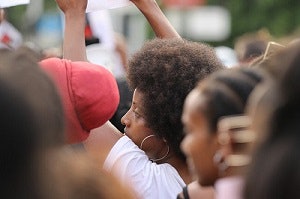As a former K-12 teacher and now a professor, Dr. Patrice W. Glenn Jones had a question: What motivates and deters Black students when they want to participate in activism? And how can educators empower Black student voices?
An assistant professor of English at Embry-Riddle Aeronautical University Worldwide, Jones authored a new report titled, “Activism Deferred Among Black American students,” published by Rutgers University’s Samuel DeWitt Proctor Institute for Leadership, Equity, and Justice on Wednesday.
Her research explores how Black high school and college students at predominantly Black institutions think about activism through qualitative interviews with 17 students between March 2018 and December 2019. While her research was conducted before, the report comes out not long after protests swept the country on behalf of George Floyd, a Black man killed in police custody in Minnesota.
At the time, Jones was struck by how voiceless students felt.
“Most of them communicated [that] they just felt like they were invisible and nobody cared and nobody listened to them and they just had this lack of power in their own lives and their own destinies,” she said, a thread she found “extremely alarming.”
Overall, in conversations with students, Jones teased out four major themes: Black students felt unheard; they felt deeply aware of racial inequities; they felt a desire to participate in social activism but didn’t always know how to go about it; and they found themselves motivated by a sense of group belonging and collective action.
That last component – collective identity – is why she chose to focus on students from predominantly Black high schools and historically Black colleges. Jones earned her Ph.D. in educational leadership at an historically Black institution, Florida A&M University. She wanted to see what students thought about activism in the context of a “shared sense of community,” a “shared sense of responsibility” and “shared values,” she said, and whether that environment nurtured their social engagement.
She noticed that students who didn’t see their families or communities participating in activism often felt like they didn’t know how to participate, even if they wanted to get involved in organizing.
“Not all students, not all people, come from a family like mine where there’s this strong connectivity,” she said. But at college, and particularly at historically Black colleges and universities (HBCUs), students forge strong bonds and “often, we make our family.”
Research does in fact indicate that Black first-year students at HBCUs show higher levels of civic engagement than Black first-year students at predominantly White institutions, said Dr. Andrés Castro Samayoa, assistant professor of educational leadership and higher education at Boston College. He authored a 2018 report called “Understanding Black Students’ Social Agency at Historically Black Colleges: Data From a National Survey.” He thinks HBCUs both attract students already invested in activism and proactively foster it.
“To be at a historically Black college is to be in a place that is openly thinking through the racial stratification that is part and parcel of the U.S.,” he said. “I think that all institutions [need to] play an important role in developing a civic consciousness that has an awareness of racial injustice. But historically Black colleges do that in a way that is already embedded into its fabric by necessity, by the fact that their origins are always a reminder of the injurious segregation in this nation.”
He hopes higher education institutions will look to HBCUs as an example of how to cultivate Black student activism.
“Institutions need to extend beyond the premise that students are solely consumers or solely the source of tuition funds or what gives an institution prestige,” he said. “Students are also the agents that can enact really important cultural change, not just within college campuses but beyond.” He wants campus leadership to partner with them to share the burden.
That’s really the end goal of Jones’ research – to make it a priority for educators, from kindergarten upward, to foster a sense of agency in their Black students through “collective learning.”
As she studies the state of education, she thinks it has a ways to go, she said, but teachers and faculty can start by just offering opportunities for students to share opinions. She suggested that universities, especially those located in Black communities, hold classes and community events on civic engagement and past activist movements with a focus on discussion.
“One of the things that has always been problematic for me – but it coincides with what the students were conveying – is that so often we don’t expect students to have an opinion or thoughts or ideas,” she said. “We sit them in the chair, we tell them, ‘Be quiet, and do what I tell you to do. There’s a right and wrong answer to everything, and if you don’t get this answer, you’re wrong.’ As opposed to opening students up to think for themselves.”
When she was an English teacher, Jones said she encouraged students to write about current events. And ultimately, her students – of their own volition – started a project to register their families and communities to vote.
Without an approach like this, “we’re restricting them,” she said. “We’re placing a muzzle over their ideas and their ability to be creative and innovative.”
Jones believes the outcomes of her research would have been different had student interviews been conducted after this summer’s protests over George Floyd, as young people took to the streets. But she also felt like she saw reflections of her research in the protests when she heard young Black protesters say over and over again, “We’re tired of this.”
To her, it’s the educator’s job to make sure this isn’t a passing moment of empowerment.
Black students’ sense of agency needs to be “continuous from one generation to another,” she said. “We are passing along a torch.”
Sara Weissman can be reached at [email protected].


















